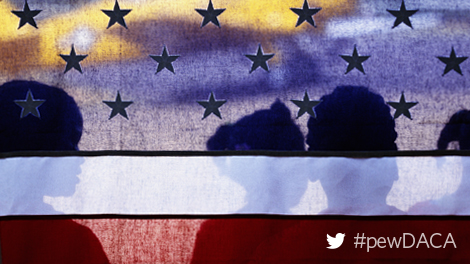Two Years of DACA—The Deferred Action for Childhood Arrivals Program
The State and Local Story
On the second anniversary of the Obama administration’s Deferred Action for Childhood Arrivals (DACA) program, this event brings together experts to discuss the role of states and localities in implementing DACA, its impact in key metropolitan areas, and how the public views DACA and immigration in America.

Speakers include:
- Adam Hunter (moderator)—director, immigration and the states project, The Pew Charitable Trusts (@amhindc)
- Michele Waslin, manager, immigration and the states project, The Pew Charitable Trusts
- Amalia Rioja, deputy chief of staff, Office of Governor Pat Quinn, State of Illinois
- Audrey Singer, senior fellow, Metropolitan Policy Program, The Brookings Institution (@audsinger)
- Mark Hugo Lopez, director of Hispanic research, The Pew Research Center (@mhugolopez and @pewhispanic)
Since being implemented on Aug. 15, 2012, DACA has allowed nearly 600,000 unauthorized young immigrants to live and work legally in the United States. While DACA provides a two-year protection from deportation, it does not provide legal status or a pathway to citizenship. The federal government administers DACA, but states and localities have responded to the program in different ways. That has led to differing experiences and outcomes for individuals approved for DACA.
This event is open to the public, but space is limited.
To attend in person, please register here by Friday, Aug. 8, 2014.
Agenda
Tuesday, Aug. 12, 2014
1:30–2 p.m.
Registration and refreshments
2–2:05
Welcome: Susan Urahn, executive vice president, The Pew Charitable Trusts
2:05–2:10
Introductions: Adam Hunter, moderator and director, immigration and the states project, The Pew Charitable Trusts
2:10–2:20
Michele Waslin, manager, immigration and the states project, The Pew Charitable Trusts
- An overview of state and local roles and responsibilities relating to DACA, based on Pew’s recent report, “Immigration and Legalization.”
2:20–2:30
Amalia Rioja, deputy chief of staff, Office of Governor Pat Quinn, State of Illinois
- The Illinois experience in responding to DACA.
2:30–2:40
Audrey Singer, senior fellow, Metropolitan Policy Program, The Brookings Institution
- The impact of DACA in key metropolitan areas, based on recent findings and research underway.
2:40–2:50.
Mark Hugo Lopez, director of Hispanic research, The Pew Research Center
- Pew Research findings on public perceptions of DACA, immigration reform proposals, and immigrants.
2:50–3:30
Discussion


America’s Overdose Crisis
Sign up for our five-email course explaining the overdose crisis in America, the state of treatment access, and ways to improve care
Sign up





